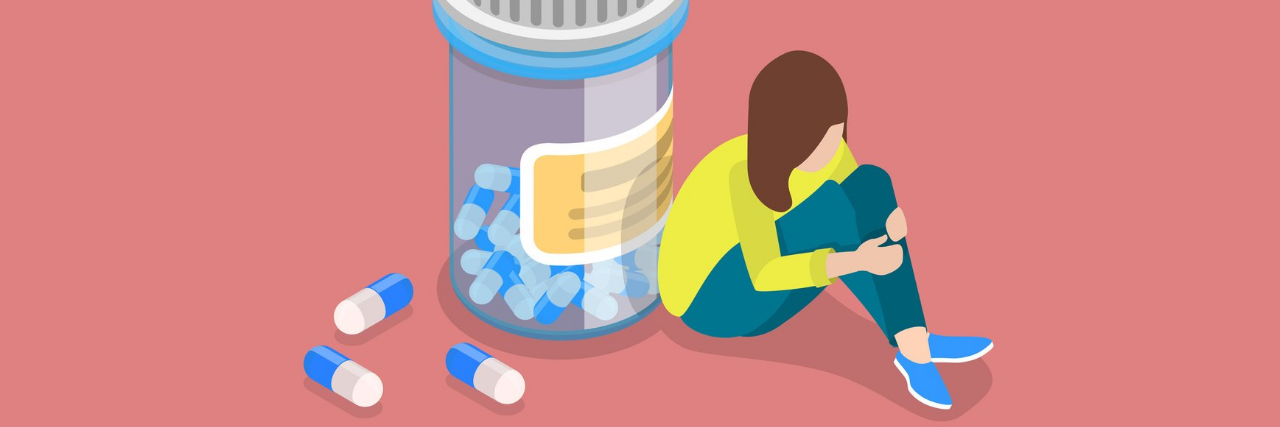I’ve had deeply rooted feelings of embarrassment due to my lack of ability to swallow pills for a long, long time now. I’m “one of those patients,” as a doctor just referred to me yesterday while I sat freezing in a cold urgent care exam room. I’ve been up against this obstacle for years now. I have heard every response once I announce I can’t take a pill when it’s time to prescribe me a medication — and I mean all of the responses:
“I know you don’t like pills, but this one could really help your symptoms.”
“But it’s really tiny, you won’t even notice!”
And my least favorite: “Well, you’re going to have to work on that one, young lady.”
Regardless of the response, I’ve often been met with shock that I’ve lived a life mostly without medicated relief.
The truth is, I have worked on this for years. It’s been a royal pain in my butt knowing sometimes relief is just on the other side of a fear of mine. More accurately, it’s a post-traumatic stress disorder (PTSD) trigger I’m up against. Through a series of traumatic events throughout my young life, I’ve developed the inability to take pill form medications.
A few months ago, during another urgent care visit, with the same doctor from yesterday, I turned him down on a medication that is pill form. He was taken aback and asked, “Why?”
I explained I have PTSD surrounding pills and asked him to please prescribe me something that isn’t in pill form. He chuckled and said, “So, you have chronic pain that needs pills and you have PTSD from taking pills? Well, isn’t that something. Huh.”
I wanted to correct him on that: I have PTSD that prevents me from currently taking pills. But even if I had a traumatic event while taking a pill, that would still be worthy of compassion. Instead, I saved my energy and walked out of his office with a script for one pediatric dosage of an antibiotic and an adult dosage of a steroid in pill form that I could safely crush. On the other hand, the pharmacist suggested applesauce and smiled kindly when I got my prescription filled. (Pharmacists are the only people who have never challenged me on this.)
Like I said before, this pill problem is one I’ve lived with for years. I have had the embarrassment of having to take a pediatric form of many medications for just as long. I have had no medications available for me because of this issue too. I lived years without any relief because of my PTSD. My primary care physician and I are watching closely for the FDA approval of a liquid form of a medication I really could use for my other chronic pain conditions and my chronic illness. It’s an estimated two-year wait. I’m using alternative methods available to me as pain management for those that medications no longer help.
And let me clear about this: I do want medications that will help me find some relief. I’ve learned to adapt to every one of those made available to me. But for those of us up against PTSD triggers that impact all areas of our health treatment, we’re lacking a lot of support. My doctors have constantly had to argue with my insurance for medications that are not traditionally prescribed to adults in the form I need. And let’s not be mistaken here: A lot of these medications are available in other forms than pills. There are alternative forms that are often better and offer relief more quickly than a pill, but they’re often more expensive and insurance companies don’t like that.
I feel like an armchair expert on how to take liquid, dissolvable, chew tabs and shots that work around my PTSD trigger. After all, I have been battling all these things for simply years. I have had severe pain and health issues I’ve had to literally suffer through without any relief and I now have a higher tolerance to illness because of this.
By sharing all of this, I hope to bring a little awareness around this issue where physical health and mental health meet at a crossroads. First of all, more doctors need to meet patients where they are. Once a patient expresses a limitation, respect it. In my case, my primary care physician did after a blunt discussion on the whys behind my avoidance of certain medications. She then fought the insurance company for my needs.
Secondly, insurance companies need to provide their patients with the medications they need. We’re human beings and not all of us fit a certain mold, statistic, or guideline. Most importantly, healthcare needs to provide the best care to their patients without fighting against their patients in the process.
Thirdly, when an explanation of a mental health disorder is given, respect that. Don’t chuckle, scoff, or act taken aback. Mental health disorders such as PTSD impact so many people in our country and as those of us with PTSD know all too well, some triggers may seem “ridiculous,” but they are very, very real to us.
Finally, I’m still working on my overall health. The day may come that I overcome this particular trigger. No doubt, it’ll be a day worth celebrating if that day comes. And if it doesn’t, I will still be my own best advocate. After all, no one knows my body and brain better than I do.
Getty image by TarikVision

